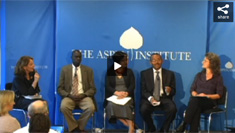 Loading the player…The original version of this article, by John Donnelly, appeared on the
Loading the player…The original version of this article, by John Donnelly, appeared on the Global Post.
The U.S. Census Bureau’s World Clock says that the
population of the world today is estimated at 7.008 billion people, while projections show that the world could reach the
9 billion marker by 2050.
In the last of its series called “7 Billion: Conversations That Matter,” Aspen Institute’s Global Health and Development hosted a panel of experts based in Africa and the United States on the interconnectedness of gender issues, family planning, population, and access to safe water.
The point of the series was to ask questions about why it mattered that the world was passing the seven billion mark, and the questions today in Washington were appropriately big: Will water wars replace oil wars? What are the solutions to expand water and sanitation to the 2.5 billion people who don’t have it? And just how many people can the world support in an equitable fashion?
An answer to the last question: You need a bigger pie, better manners, and fewer forks.
Borrowing from a book by Joel Cohen called How Many People can the Earth Support? (written in 1996 when the world supported a 5.7 billion population), Laurie Mazur, director of the Population Justice Project, said that the answer was “it depends on how we use resources.”
Continue reading on the Global Post.
Sources: U.S. Census Bureau.
 Loading the player…The original version of this article, by John Donnelly, appeared on the Global Post.
Loading the player…The original version of this article, by John Donnelly, appeared on the Global Post. A Publication of the Stimson Center.
A Publication of the Stimson Center.




